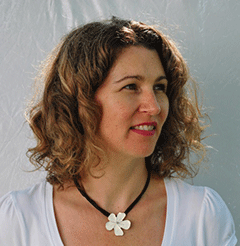Island Health has many women making great strides in the fields of science and research, patient care, leadership, administration, and housekeeping. We are proud of the women who serve our region and who strive to making our organization a fair, equal and inclusive workplace.
To mark International Women’s Day, we have interviewed one of our eminent researchers, Dr. Nichole Fairbrother, who is making a difference in the lives of mothers and mothers-to-be.
Dr. Nichole Fairbrother is an Assistant Professor with the UBC Department of Psychiatry and the Island Medical Program and works closely with the Island Health Mental Health and Addiction Services Department. She holds four Island Health-funded research grants:
• “The Validity of the Childbirth Fear Questionnaire as a Screening Tool for Specific Phobia of Childbirth”
• “New mothers' thoughts of harm: Prevalence and relation to OCD and child harm”
• “Online cognitive behaviour therapy for postpartum obsessive compulsive disorder”
• “Midwife-assisted, online cognitive behaviour therapy for fear of childbirth.”
Her current research studies anxiety disorders among pregnant and postpartum women.
Tell me about the perinatal research you’re working on:
Right now is a very exciting time for the Perinatal Anxiety Research Lab. We have recently completed data collection for a study of new mothers’ thoughts of infant-related harm and their relationship with obsessive compulsive disorder (OCD) and parenting behaviours. We are now in the process of analyzing the data from this research.
Our first two journal submissions (planned for this spring) will pertain to: (a) the prevalence of OCD among pregnant and postpartum women, and (b) the relationship between new mothers’ thoughts of harm and parenting behaviours. We are also working on an extension of our harm thoughts research as well as two new studies of cognitive behaviour therapy for: (a) fear of childbirth and (b) postpartum OCD.
What does International Women’s Day mean to you?
For me, women’s day is an opportunity to celebrate women and the ways in which women have contributed to a healthy and positive society through their advocacy, engagement and achievements. It is also an opportunity to remember the ways in which women continue to experience systematic discrimination and disadvantage compared with men in many parts of the world and in many ways. This reminder is important as it provides an impetus to care and to proactively engage in creating change.
What does feminism mean to you?
I place high value on compassion, fairness and equality. For me, these values apply to all humans. I deeply believe in the importance of fairness and equality for men and women across all gender identities. That said, women continue to experience disadvantage relative to men in many parts of the world and in many spheres of life. One of the places where women’s lives often travel along traditional gender roles is during reproduction and early parenting. It is typical for women to carry significantly more of the responsibility of early parenting and domestic life, often at the expense of career achievement and personal pleasure.
For me, feminism means contributing to the wellbeing of women, making the world a healthier, kinder, fairer place for women to be. It also means doing what I can to increase the value we place on activities that are either inherently or have typically been the purview of women (e.g., reproduction and early parenting). I hope that my research makes this kind of contribution, making a difference to the lives of women, allowing them to live fuller and more rewarding lives.
How do you believe your work is influencing and affecting women?
My work in the area of perinatal anxiety disorder prevalence has helped to highlight just how common these disorders are, especially among women. My hope is that this will bring attention to these difficulties and lead to improved access to screening and treatment. The research we conduct in the area of new mothers’ unwanted, intrusive thoughts of infant related harm has helped to show that these types of thoughts are a normal postpartum experience. This is so important, particularly as pertains to unwanted, intrusive thoughts of intentionally harming one’s infant. These kinds of thoughts can be very frightening to the women who experience them, leading to fears that they may harm their infant or have their infant removed from their care.
We know that, among vulnerable women, thoughts of infant-related harm can snowball into obsessive compulsive disorder, especially if women are not provided with accurate information about the meaning of the occurrence of the thoughts. Our work endeavours to develop a strong knowledge base in this area in order to educate women about postpartum harm thoughts.
More recently, we have begun the development of a suite of online interventions for perinatal anxiety disorders. We have been awarded funding to develop online interventions for fear of childbirth and for postpartum obsessive compulsive disorder. The interventions are cognitive behavioural (CBT). They are self-administered, online, with therapist support. CBT is the treatment of choice for most, if not all, anxiety disorders, and yet is largely unavailable or very expensive. It is our belief that this is particularly problematic for pregnant and postpartum women because of concerns

